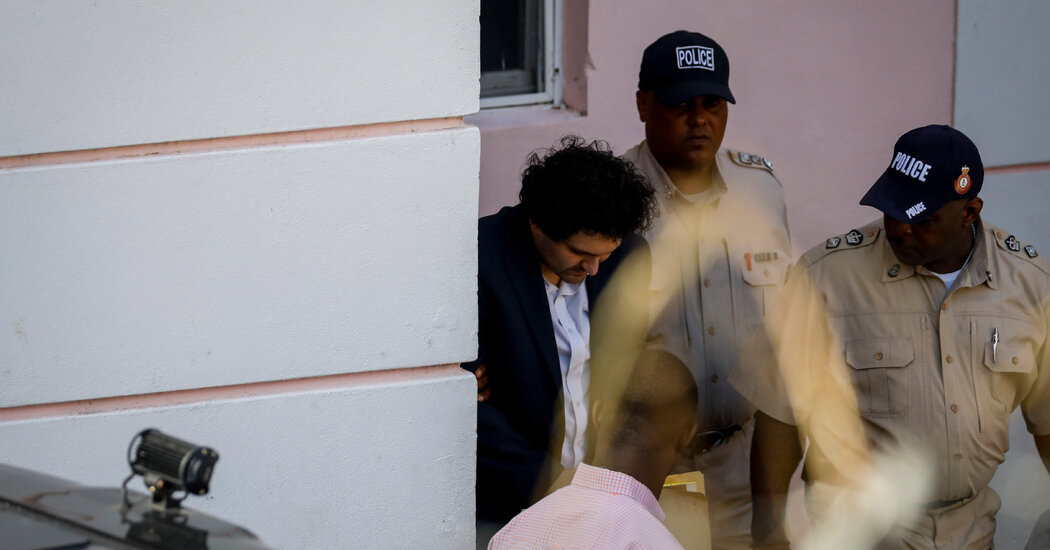Sam Bankman-Fried’s legal team is discussing a deal with federal prosecutors that would allow the disgraced cryptocurrency tycoon to be released on bail when he is extradited to the United States, according to three people with knowledge of the case.
The terms of the deal remain volatile, the people said, and any deal would require approval from the federal judge overseeing Mr. Bankman-Fried’s case. But under the terms discussed, the founder of collapsed cryptocurrency exchange FTX could get bail with very restrictive conditions, including house arrest, two of the people said. One person indicates that electronic supervision is also being discussed. It was not clear what other measures might be necessary.
Prosecutors in New York’s Southern District have charged Mr Bankman-Fried, 30, with fraud and of organizing a year-long scheme that culminated in FTX’s bankruptcy. The company was based in the Bahamas and Mr. Bankman-Fried is currently imprisoned there awaiting extradition to the United States.
A spokesman for the Southern District of New York declined to comment on bail discussions. Mark Cohen, an attorney for Mr Bankman-Fried in New York, did not respond to a request for comment.
Fox News previously reported on some details of the bail talks.
The charges against Mr Bankman-Fried came at the end of a saga in which one of the world’s most powerful crypto billionaires went from an industry titan to an accused fraudster and saw his fortune vanish. Before FTX collapsed, Mr. Bankman-Fried was a frequent presence in the halls of Congress, pushing legislation to make the United States friendlier to the crypto industry. The fall of FTX has given the crypto industry a black eye and it is already cited as a cautionary case study.
What you need to know about the collapse of FTX
What is FTX? FTX is a now-bankrupt company that used to be one of the world’s largest cryptocurrency exchanges. It enabled customers to trade digital currencies for other digital currencies or traditional money; it also had a native cryptocurrency known as FTT. Based in the Bahamas, the company built its business on risky trading options that are not legal in the United States.
Mr. Bankman-Fried’s extradition to the United States is expected to take place on Wednesday. It was held up once this week after a chaotic hearing in the Bahamas, where a local lawyer representing him questioned whether his client would agree to extradition. The lawyer, Jerone Roberts, later returned and paved the way for Mr. Bankman-Fried’s transfer to New York.
Mr Bankman-Fried was denied bail in the Bahamas after being arrested last week at his luxury apartment complex on the island of New Providence. At a hearing on Dec. 13, a judge in the Bahamas said Mr. Bankman-Fried made him a flight risk.
Once he arrives in the United States, Mr. Bankman-Fried is arraigned in Federal District Court in Manhattan, where his case is overseen by Judge Ronnie Abrams. Authorities have charged that he embezzled billions in FTX deposits, defrauding customers, investors and lenders in the process.
Mr. Bankman-Fried wouldn’t be the first defendant to come from extreme wealth to be prosecuted in the Southern District Courthouse, nor would he be the first to try to negotiate a way to avoid a pending sentence. ends up in prison after his trial. Some have been successful; others have not been.
Bernard L. Madoff, the notorious Ponzi schemer, was posted $10 million bail and remained under house arrest in his penthouse apartment until he pleaded guilty in 2009. He died in prison last year at the age of 82 while serving a 150-year sentence.
The aftermath of FTX’s demise
The sudden collapse of the crypto exchange has stunned the industry.
In 2016, Reza Zarrab, a Turkish gold trader indicted in an Iran sanctions case, offered to put up a $50 million bond, secured with $10 million in cash, and to stay in a rented apartment and wear a GPS monitoring device. He also suggested paying 24-hour guards to make sure he didn’t flee.
But the judge, Richard M. Berman, refused bail, saying the proposal was “unreasonable because it helps to promote inequality and unequal treatment in favor of a very small cohort of criminal defendants who are extremely wealthy, such as Mr. Zarrab .”

